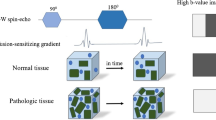Abstract.
Dynamic susceptibility contrast magnetic resonance imaging (DSC MRI) provides a noninvasive means to create high resolution maps of the regional distribution of cerebral blood volume (CBV). Most DSC MRI studies conducted to date have focused on the evaluation of patients with cerebral neoplasms, ischemia or infarction, and epilepsy. However, preliminary work suggests that DSC MRI may also provide clinically important information for the evaluation of patients with neuropsychiatric disorders, especially dementia and schizophrenia. Additionally, with appropriate modification, DSC MRI may be used to reliably evaluate the effects of pharmacological challenges on cerebral hemodynamics. As pharmacotherapy is an important component in the treatment of a range of psychiatric disorders, the dynamic assessment of changes in cerebral perfusion associated with drug administration may ultimately lead to the development of “brain function tests” for a wide range of disorders.
Similar content being viewed by others
Author information
Authors and Affiliations
Rights and permissions
About this article
Cite this article
Renshaw, P., Levin, J., Kaufman, M. et al. Dynamic susceptibility contrast magnetic resonance imaging in neuropsychiatry: present utility and future promise. Eur Radiol 7 (Suppl 5), S216–S221 (1997). https://doi.org/10.1007/PL00006895
Issue Date:
DOI: https://doi.org/10.1007/PL00006895




